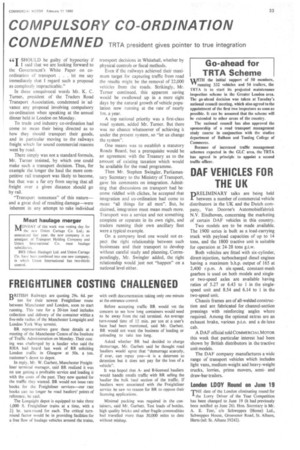COMPULSORY CO-ORDINATION
Page 35

If you've noticed an error in this article please click here to report it so we can fix it.
CONDEMNED TRTA president gives pointer to true integration 64 T SHOULD be guilty of hypocrisy if .II. I said that we are looking forward to the Government's White Paper on co
ordination of transport . . let me say immediately that I regard such a proposal as completely impracticable."
In these unequivocal words Mr. K. C. Turner, president of the Traders Road Transport Association, condemned in 'advance any proposal involving compulsory co-ordination when speaking at the annual dinner held in London on Monday.
To trade and industry co-Ordination had come to mean their being directed as to how they should transport their goods, and in particular moving to the railways freight which for sound commercial reasons went by road.
There simply was not a standard formula, Mr. Turner insisted, by which one could make such a transport decision. Thus, for example the longer the haul the more competitive rail transport was likely to become, but that was a far cry from saying that all freight over a given distance should go by rail.
"Transport nonsenses" of this nature— and a great deal of resulting damage—were inherent in any attempt to take individual transport decisions in Whitehall, whether by physical controls or fiscal methods.
Even if the railways achieved their maximum target for capturing traffic from road the results might be the removal of 22,000 vehicles from the roads. Strikingly, Mr. Turner continued, this apparent saving would be swallowed up in a mere eight days by the natural growth of vehicle population now running at the rate of nearly lm. a year.
A top national priority was a first-class road system. added Mr. Turner. But there was no chance whatsoever of achieving it under the present system, so "let us change the system".
One means was to establish a statutory Roads Board, but a prerequisite would be an agreement with the Treasury as to the amount of existing taxation which would be available for the road programme.
Then Mr. Stephen Swingler, Parliamentary Secretary to the Ministry of Transport, gave his comments on integration. Admitting that discussions on transport had become riddled with cliches, he accepted that integration and co-ordination had come to mean "all things for all men". But, he claimed, integration must mean much more. Transport was a service and not something complete or separate in its own right, and traders running their 'own ancillary fleet were a typical example.
On a company level one would not expect the right relationship between such businesses and their transport to develop without careful study and planning. Correspondingly, Mr. Swingler added, the right relationship would just not "happen" on a national level either.




























































































































